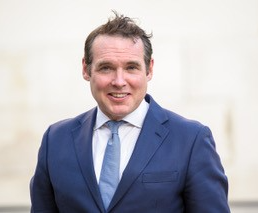Two Minutes With…David Butcher, Founder, Communications and Content

We catch up with David Butcher, founder of Communications and Content, on why readability matters, how he uses podcasts for work, and his latest report on indecipherable investment content.
Tell us a bit about yourself and Communications and Content
I run a consultancy called Communications and Content.
We offer financial services companies corporate positioning, corporate communications, and content / thought leadership – with the emphasis on the latter.
The goal is to help clients communicate with more imagination, energy and purpose.
What makes you different?
I’ve been in the market about 25 years. I’ve done agency and client side. I’ve worked on investment floors and sat in those difficult board meetings – and clients tell me they value that accumulated wisdom.
Second, we offer clients a holistic view of the world they sit in – not just their immediate environs. What I mean is that we think about a company’s reputation when we write their content, and we consider commercial priorities when we discover their messaging. I like joining all those dots between the big things and the small.
Maybe everyone thinks this way and I’ve not noticed – but, that nagging doubt aside, I’m convinced it’s a differentiator.
What’s the readability report?
Every year we measure the investment content published by award-winning companies for readability. Namely, is this stuff easy to read or not? That’s the whole point of publishing these reams of material, isn’t it? So, it gets read.
The problem is, I think we all know it’s jargon laden at best, incomprehensible at worst. The report puts data behind those assumptions, so marketing directors can sit down with subject matter experts and give them empirical data about what they’re creating, so they can make it more readable.
The report also enables us to show clients the research and writing we’re capable of – rather than just telling them.
I’m particularly pleased with our latest report. It was a joy to write and the initial response has been very positive.
What positives have you taken from the whole lockdown experience?
If I think of any you’ll be the first to know! In real terms I value the time I’ve spent with my sons, I’ve got really fit and I’ve fallen back in love with music again.
Is there a book or podcast that is essential reading or listening for your industry?
I use podcasts for work indirectly. I get very inspired by the storytelling craft in say Malcolm Gladwell’s ‘Revisionist History’ or Dan Carlin’s ‘Hardcore History’ – and have used techniques from both in my work.
I’ve also just come across the superb BBC Ulster ‘Assume Nothing’ series and am thinking about what I can use from it.
Who has single-handedly made your industry better?
My old M&G colleague Jim Leaviss (who I only worked with indirectly) is I think one of the most remarkable communicators of complex financial information.
If you could give a younger version of yourself one piece of financial advice, what would it be?
Save more and sooner. Have more self-confidence when asking for pay rises. That’s two of course – but they’re closely linked!
What three things would you do if you were head of the FCA for the day?
Look in detail at assessment of value reports. Our research says just 53% of firms bother to publish them and those that do rarely create something a lay person can actually understand. I’ve read plenty and they’re like sitting an economics ‘A’ level – not pleasant.
Second and third I’d use carrot and stick on diversity. The current narrow demographic in financial services creates grouplook, groupthink and groupact. And the more the industry drifts from the UK average population the more problems it faces in future.
What is the one column or website that you read every day?
Once it was the peerless Philip Stephens. Now its Robert Shrimsley. Can I add Marina Hyde too?
What would you do if you received a windfall of £10,000?
Take my boys on holiday. I should pay off a bit of the mortgage but, y’know, pandemic and everything.
